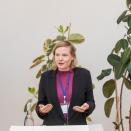DGAP’s Center for Order and Governance in Eastern Europe, Russia, and Central Asia assesses current dynamics in the post-Soviet states in the context of domestic political changes as well as regional and global power shifts. It not only covers the entire space consisting of Central Europe, the Black Sea region, the South Caucasus, Russia, and the countries of Central Asia, but also explores the growing role of China.
Main Topics:
- Disintegration of the post-Soviet space in the context of Russia’s war on Ukraine and the weakening of Russia as a security actor and hegemon in its neighborhood
- The new European security order in the context of Russia’s war of aggression
- Changing regional orders with a special focus on the role of Russia, China, Turkey, and Iran in Eastern Europe, the Black Sea region, the Western Balkans, the South Caucasus, and Central Asia
- Domestic political, technological, and social developments in the states of the region that include democracy and the rule of law in Ukraine; regime developments and elite change in Russia; Russia’s sovereign Internet; and civil societies in Georgia, Moldova, and Armenia
- Eastern Partnership and European Enlargement Policy as well as EU policy toward Russia, Central Asia, and the Black Sea region
- The reconstruction of Ukraine and its future in Europe
Read more
Applications for Our Research
The rules-based, international order is under massive pressure. The countries of Central and Eastern Europe and Central Asia are going through dramatic changes in terms of their security, technology, and economy. Russia’s war of aggression against Ukraine has shaken the European security architecture and posed new challenges for Germany’s role in the EU and its eastern neighborhood. While the war initially united the West, growing fault lines are emerging among partners.
The research and advisory services of our international team focus on geopolitical and security policy and societal and technological trends. We conduct research on security and geopolitical shifts across the post-Soviet region in the context of Russia’s war of aggression on Ukraine. We assess the unresolved conflicts in the South Caucasus, Russia’s role in Central Asia, and the influence of actors such as China, Turkey, and Iran in the region. We also examine the future of the EU’s Eastern Partnership and the further development of the European Neighborhood and Enlargement Policy, for example regarding Ukraine, Moldova, and the Western Balkans.
We focus on domestic political trends and – together with our network of associate and visiting fellows – explore not only regime developments and technological trends in Russia but also domestic political developments in countries including Moldova, Hungary, Poland, and Georgia, among others. Based on this analysis, we develop recommendations for German and EU policy toward Russia, Eastern Europe, and the future of Ukraine.





















